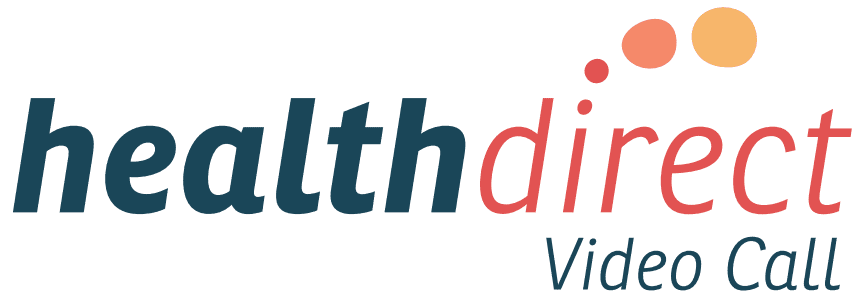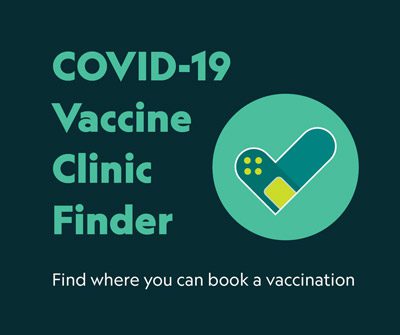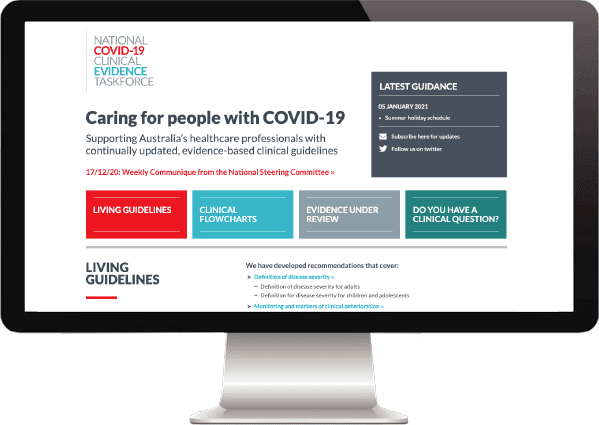COVID-19 (coronavirus)
Information for health professionals
Healthy North Coast has worked closely with the NSW Public Health Unit and our primary health care workforce since the beginning of the COVID-19 pandemic to support our local communities. Sign up to our newsletter to receive important updates direct to your inbox.
You can also view our latest COVID-19 news stories or check out upcoming COVID-19 education and events. If you can’t find the COVID-19 information you are looking for below, please get in touch with us
using this contact form
COVID-19 Primary Health Care
Receive the latest local COVID-19 information via our Healthy North Coast newsletters
- Mid and North Coast HealthPathways including:
- COVID-19 Ongoing Assessment and Management

- COVID-19 Case Management Tools and Resources *NEW*

- COVID-19 Referrals including how to refer patients to the LHD for escalation

- COVID-19 Isolation Support *NEW*

- COVID-19 Assessment and Management in Residential Aged Care

- COVID-19 Initial Assessment and Management

- COVID-19 Ongoing Assessment and Management
- National COVID-19 Evidence Taskforce including clinical flowcharts
 with up-to-date guidance for:
with up-to-date guidance for:- pathways to care for adults with COVID-19
- management of adults with mild COVID-19
- management of people with COVID-19 who are older and living with frailty and/or cognitive impairment
- care of people with post-COVID-19.
- RACGP COVID-19 information for GPs including:
- Home-care guidelines for patients with COVID-19 (PDF, 2MB)

- Managing COVID-19 at home with assistance from your general practice – a guide, action plan and symptom diary for patients (complementary patient information, PDF, 1.6 MB)

- Home-care guidelines for patients with COVID-19 (PDF, 2MB)
COVID-19 vaccination
Stay up to date
We understand it can be challenging to keep up to date with the latest information on the COVID-19 vaccination program. To receive the latest developments and news:
Clinical guidance
Mid & North Coast NSW HealthPathways
Australian Technical Advisory Group on Immunisation (ATAGI)
- ATAGI clinical guidance on use of COVID-19 vaccine in Australia
- ATAGI clinical advice for primary care services administering AstraZeneca COVID-19 vaccine
- ATAGI statement on AstraZeneca vaccine in response to new vaccine safety concerns
- Joint statement from ATAGI and THANZ on Thrombosis with Thrombocytopenia Syndrome (TTS) and the use of COVID-19 Vaccine AstraZeneca
- Joint statement between RANZCOG and ATAGI about COVID-19 vaccination for pregnant women
- Updated ATAGI advice on administering seasonal influenza vaccines in 2021
Reporting adverse events following immunisation
Information, support and resources
The Australian Government Department of Health’s COVID-19 vaccine website hub provides a range of useful information and resources for the COVID-19 vaccination program, for:
Additional resources for vaccination providers
- Communication and patient resources
- Vaccine safety and surveillance
- Training, learning and development
COVID-19 clinical information
Mid & North Coast NSW HealthPathways has up-to-date COVID-19 clinical information for GP point-of-care
- COVID-19
- COVID-19 Vaccination Information
- COVID-19 Case Detection
- COVID-19 Case Management Tools and Resources
- COVID-19 Isolation Support
- COVID-19 Assessment and Management in Residential Aged Care
- COVID-19 Ongoing Assessment and Management
- COVID-19 Referrals
- COVID-19 Information
- COVID-19 Impact on Clinical Care
- COVID-19 Impact on Local Services
- COVID-19 Recent Changes
- COVID-19 MBS Items
- COVID-19 Telehealth
- Post-COVID-19 Conditions
- Notifiable Diseases
- Pandemic Respiratory Illness
For a list of all localised pathways see:
Mid and North Coast Localised Pathways
Username: manchealth
Password: conn3ct3d
For further information about HealthPathways email [email protected] or [email protected]
Watch this two-minute video to learn how the HealthPathways COVID-19 response package helps general practice teams manage patients, prepare the practice, and keep up-to-date with rapid change in the health system. See how to send feedback on the content.
National COVID-19 Evidence Taskforce
The National COVID-19 Clinical Evidence Taskforce website provides:
- Living guidelines — high-priority, evidence-based clinical COVID-19 guidelines updated weekly with the latest research
- Clinical flowcharts — incorporating living guideline recommendations and guidance issued or endorsed by Taskforce members
- Evidence under review — continuously reviewing new evidence to update recommendations and address new priority questions
- Opportunity to ask your clinical questions — you can help us to identify and prioritise questions to include in the living guideline.
Self-care patient triage/infection control/PPE/telehealth
Self-care patient triage
Visit the Self-care Patient Triage and Support HealthPathway for valuable practice resources, scripts and guidance on:
- planning your emergency practice response
- developing a daily workflow plan
- a standard script for reception staff or practice nurses
- examples of practice software shortcuts
- responding to concerns about the illness and symptoms in adults or children
- responding to concerns about breastfeeding, usual illnesses, and medications
- responding to concerns about household contacts
- responding to concerns about isolation – immediate needs and mental wellbeing
- patient support after hours
- de-isolation planning.
Need login details for HealthPathways?
Username: manchealth
Password: conn3ct3d
Infection prevention and control
For recommended infection control measures, visit the COVID-19 PPE, Infection Control and Exposure Repsonse HealthPathway.
Review the Department of Health’s Work Permissions and Restrictions Framework for Workers in Health Care Settings to assess exposure level, risk matrices and the requirements for workers in healthcare settings who are exposed to COVID-19.
Visit our Primary Care Impact site and review the list of COVID-19 Community Transmission support topic pages. Here you will find added guidance and resources to help your practice prepare and manage potential exposure to COVID-19.
If a staff member is a contact of a positive COVID-19 case, follow NSW Health instructions on testing and self-isolation periods for:
- Close contacts – people who have been identified as a close contact of someone with COVID-19.
- Casual contacts – people who have been identified as a casual contact of someone with COVID-19.
You can also:
- download updated advice on the use of PPE for health workers
- access the NSW Health Infection Prevention and Control Manual
- download a Department of Health factsheet on environmental cleaning and disinfection principles for COVID-19
- Read the Australian Government’s COVID-19 infection control online training
Telehealth — COVID-19 MBS items
The MBS telehealth items are available to GPs, medical practitioners, specialists, consultant physicians, nurse practitioners, participating midwives, allied health providers and dental practitioners in the practice of oral and maxillofacial surgery.
Visit MBS Online for a full list of telehealth item numbers and a range of factsheets. Enquiries on the Medicare Benefits Schedule, including using and interpreting items numbers, should be directed to: [email protected]


healthdirect Video Call access now available
North Coast healthdirect Video Call is available for our health workforce to be able to use this purpose-built suite of services, tools and resources.
Get started today!
We can create individual clinic accounts for Mid and North Coast general practices, AMSs, mental health care professionals and other primary care providers that wish to use video calls. This is part of our COVID-19 response, but can also be used for standard service video calls/consultations.
Our Digital Health Team will create your logins and support you to start using this great platform.
Additional support and local resources
Border and travel restrictions
Border and travel restrictions are being updated regularly in response to the evolving COVID-19 pandemic. Anyone planning to travel should check the relevant government website for advice:
- See NSW Government Travel Advice for information about travelling to and from NSW. This site also contains information about travelling within NSW.
- All states and territories currently have restrictions in place for people travelling from NSW. Links to websites for each state and territory are available on the NSW Government website.
- See Queensland Government Border Restrictions for up-to-date information on travelling to and from Queensland.
Mental health support - patients and health workers
There is much information available on how to best support your patients’ mental health during the COVID-19 outbreak.
Click here for a comprehensive and up-to-date list of mental health and psychosocial considerations from the World Health Organisation’s (WHO).
The WHO information includes the importance of empathy towards those affected by COVID-19; ways to refer to people with the virus to reduce stigma; and suggestions on how to lessen people’s anxiety.
Other excellent material regarding mental health and the coronavirus can be found at the Life in Mind site. Life in Mind has collaborated with the National Mental Health Commission to produce a comprehensive list of resources to support those affected.
Some of these resources are listed below:
- Beyond Blue online forum (discussions about coping)
- Black Dog Institute (COVID-19 resources for anxiety, stress & wellbeing)
- Butterfly Foundation (tips and advice for people with an eating disorder) 1800 334 673
- Emerging Minds (talking to children about natural disasters, traumatic events or worries about the future)
- headspace (support for young people) 1800 650 890
- Mindspot (staying mentally and physically well) 1800 614 434
- Roses in the Ocean (mental health tips for working from home)
- Phoenix Australia (tips for self-care and families)
- Connect to Wellbeing can provide information about, or referral to, mental health and alcohol and other drugs support services located across the North Coast. Call 1300 160 339, Monday to Friday 8:30 am – 5:00 pm.
24-hour support
- Lifeline (mental health and wellbeing) 13 11 14
- Mental Health Access Line 1800 011 511
- MensLine Australia 1300 78 99 78
- Beyond Blue Support Service 1300 22 46 36
- Kids Helpline for children and young people aged 5–25 1800 55 1800
- Suicide Call Back Service if you or someone you know is feeling suicidal. 1300 659 467.
- Open Arms — Veterans and Families Counselling provides 24/7 free and confidential counselling to anyone who has served at least one day in the ADF, their partners and families 1800 011 046.
The World Health Organisation (WHO) says feeling under pressure at the current time is normal. Stress and the feelings associated with it are not a reflection on you or your work.
Be aware that managing your mental health and psychosocial wellbeing during this time is as important as managing your physical health.
View the WHO recommendations (PDF), which include:
- Ensuring sufficient rest and respite during work and between shifts
- Eating sufficient and healthy food
- Engaging in physical activity
- Staying in contact with family and friends
- Using coping strategies that have worked for you in the past
- Turning to your colleagues, your manager or other trusted persons for social support
The Royal Australian College of General Practitioners recognises that GPs’ work is often challenging and stressful. View self-care and mental health resources and services to support RACGP members.
GPs and support for older Australians
- Get set up with telehealth and online scripts so you can keep delivering care to residential patients. Click here for more information on telehealth, including access to the healthdirect Video Call service. Don’t forget that:
- You can team up with an onsite registered nurse or physiotherapist to support physical examinations.
- Home care providers can support clients to teleconference.
- Update advance care directives with patients and their families. Consider how COVID-19 changes the end of life directives for the resident and risks for the family visiting. More information is available from HealthPathways [Username: manchealth Password: conn3ct3d]
- Engage with residential care facility management and become familiar with their infection prevention and control practices and outbreak management.
- Consider regular ear wax checks now that audiology services are limited or do not have access to facilities.
- Refresh your knowledge of end-stage palliative respiratory symptom management. More information is available from HealthPathways [Username: manchealth Password: conn3ct3d]
- Older people at home can be very lonely. It is important for older people to maintain contact with their community aged care providers and not refuse services. The aged care sector is working differently to meet the safety requirements of COVID-19, e.g. a house cleaning visit may become a gardening visit and chat while maintaining physical distancing. Welfare checks are occurring regularly through a range of approaches, including waving at the front gate.
- TESTING – know which pathology services are providing mobile testing into RACFs and into private homes. The mobile services are targeting vulnerable people, not the general population. You will have one in your area!
- Update advance care directives with patients and their families. Consider how COVID-19 changes the end of life directives for the resident, the risks for the family visiting and the risks of abnormal bereavement, particularly in light of recent changes to funerals (viewing the body, public gatherings, etc). Learn more via the Australian Government Department of Health. Additional information on advance care directives is available here.
- Advance Care Planning Australia webinars are available here.
- Oxygen – encourage older people at home to order earlier than normal, supplies are tight.
- Know when staff go to work in the aged care sector. Visit the Department of Health for more information.
- They need to receive their flu vaccinations by 1 May with a certificate or evidence that they have had it.
If you work predominately in RACFs:
- Keep up to date through the cross sector aged care Basecamps. Check the ‘Looking for more information’ section below to be added to the network email list.
- Support the staff to understand that testing without symptoms gives a false reading. This is often requested when the hospitals transfer residents back.
- Support the staff to understand the significance of staff flu vaccinations. If we had a vaccine for COVID-19, would you have it?
- If you need support with infection protection and control practices with older people, check the ‘Looking for more information’ section below.
Detailed information on COVID-19 for the health and aged care sector is available from the Department of Health website.
Sector support and updates:
- Extensive funding packages are available to subsidise RACFs with outbreaks, provide staff incentives during the pandemic, etc.
- The changes to the assessment process to enter aged care services have been placed on hold.
- For daily newsletter updates to the industry, subscribe here.
- The Royal Commission into Aged Care Quality and Safety activities have been placed on hold, submissions are still be accepted with constant changing deadline.
- PPE supplies for all aged care providers are now through the one email address ensuring equal access. Limited supplies are starting to be delivered.
- NSW Ministry of Health will be including a respiratory status section in all discharge letters from hospitals.
Residential aged care facilities:
- Facilities with confirmed COVID-19 cases will be able to access personal protective equipment from the national stockpile.
- The Communicable Diseases Network Australia Coronavirus (COVID-19) Guidelines for Outbreaks in Residential Care Facilities is available here.
- Some pathology services are establishing mobile services to cover nursing homes. LHDs are considering how to support this if pathology is not available.
- Implementing visiting guidelines to no more than two visitors per day.
- All staff and visitors must carry evidence of flu vaccines by 1 May to enter homes.
- Fly-in fly-out teams are being coordinated by NSW Ministry of Health, should any RACF experience staffing issues during a COVID-19 outbreak.
Community aged care services:
- People aged 65 years and older with confirmed COVID-19 can access urgent or immediate Commonwealth Home Support Programme services for six weeks without assessment through My Aged Care.
- Commonwealth Home Support Programme services that are group social / transport activities have been encouraged to look at alternate models and funding has been made more flexible to support this.
- Community providers are routinely screening clients before a visit. For all people living in community with COVID-19 a home isolation kit is sent through the LHD Public Health Unit and includes masks, hand hygiene products and directions on how to look after themselves and their families.
- Extensive planning and preparations are underway in community aged care services. Group respite programs are cancelled and are starting to do 1:1 visits to people’s homes. Personal protective equipment is limited, particularly Commonwealth Home Support Programme services such as transport, new approaches to service are being considered.
- The COVID-19 guide for home care providers in home care is now available.
- Additional funding is available to providers to extend home care packages during COVID-19.
- Older people with no services who require support with shopping, hygiene and meals can access Commonwealth Home Support Programs during COVID-19 without an assessment. Access through My Aged Care or direct to local services.
Key resources:
The NSW Ministry of Health has enacted a statewide secondary triage system of residents in nursing homes.
All non-urgent flu and COVID-19 related calls from residential aged care facilities to NSW Ambulance will now be secondarily triaged by a remote accredited emergency physician consultation service.
All clinically appropriate patients will be diverted to community-based models of care, keeping in line with public health recommendations.
Local health districts are responding to support the triage system.
- NNSWLHD has developed a nurse practitioner led in-reach program of support for RACFs. It is now accepting referrals and providing advice and support to RACFs. Click here to download a fact sheet. Learn more via HealthPathways [Username: manchealth Password: conn3ct3d].
- MNCLHD is currently communicating the outreach pathways through COVID-19 cross sector channels to: nurse practitioners, palliative care services, community nursing services and psychogeriatric services.
- NCPHN has provided extensive support to building these systems by updating existing RACF listings and building a profile of homes and after hours key contacts, linking the LHDs together through extensive COVID-19 communication strategies and sector knowledge. Strong, collaborative, integrated ways of working are being built.
North Coast PHN is working collaboratively with the Mid North Coast and Northern NSW LHDs, residential aged care facilities and community aged care providers to ensure a coordinated response to COVID-19. Regular virtual region-wide meetings are being held and an online resource library has been created on Basecamp to support collaboration and networking across services.
NCPHN has supported both LHDs RACF planning activities through undertaking extensive planning surveys. Of note are the small number of RACFs with only RN on call coverage over night and limited GP coverage in some facilities. Other activities include supporting services that are requiring support with infection prevention and control practices. Modelling of pathways for older people during COVID-19 is in its early stages and will result in broad collaboration with LHDs and the aged care sector to provide clarity of local supports for older people during COVID-19.
Extensive planning and preparations are underway in facilities. Visitor changes with no more than two visitors at once are being enacted with many facilities stepping this up to a semi lockdown approach with only health professionals able to enter facilities. Consideration is being provided for families of residents who are terminal and/or palliative.
Families are being encouraged to communicate through telehealth and ‘window visits’ are being set up. Welfare roles have been established in some facilities to focus on maintaining family connections.
Extensive planning and preparations are underway in community aged care services. Group respite programs are cancelled and are starting to do one on one visits to people’s homes. Personal protective equipment is limited, particularly Commonwealth Home Support Programme services such as transport, new approaches to service are being considered.
Some community services are struggling to provide their standard services. Reasons are diverse, including supplies of PPE. Of note are transport services and smaller programs whose infection prevention and control understanding may need support. A toolbox of resources is currently being sourced by NCPHN to assist these programs. Transport meetings are being negotiated in NNSW with social sector support services.
Extensive planning and preparations are underway in the local health districts including a range of activities to support residential aged care facilities to keep residents at home. See ‘Secondary triage system for residential aged care‘ below.
MNCLHD has developed a listing of services and providers offering support and shopping for older people. A similar list is being built in NNSW by Social Futures. Links will be published as they become available.
Palliative Care – both LHD’s services are keen to support GPs with any complex cases during this time, in particular end stage respiratory distress with COVID-19. MNCLHD is setting up a palliative care hotline – more as this becomes available.
Dementia Australia has added a range of COVID-19 fact sheets with tips for people living with dementia.
The fact sheets are available now and include:
- Tips for people living with dementia – outlines the coronavirus/COVID-19 symptoms, hygiene tips, the importance of having a good support network, ideas to remain active and engaged while in self-isolation, and where to go for help.
- Tips for carers, families and friends of people living with dementia – outlines the coronavirus/COVID-19 symptoms, hygiene tips, helpful tips for primary carers, as well as for family, friends or neighbours, ideas for remaining active and engaged while in self-isolation, and where to go for help.
- Tips for residential care providers – outlines the impacts coronavirus/COVID-19 may have on residents, tips on alternative activities and how to support continued engagement with families and carers.
- Tips for home care providers – outlines the impacts coronavirus/COVID-19 may have on a person living with dementia, tips to reduce heightened anxiety and where to go for help.
Contact Bron McCrae, Deputy Director Healthy Living and Ageing, North Coast Primary Health Network at [email protected] or phone 0447 113 823.





